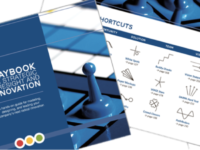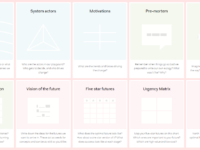Global: Anticipatory Innovation & Foresight
This working paper introduces the key concepts and features of anticipatory innovation governance. It draws on academic literature and OECD work on a range of areas including public sector innovation, foresight, anticipatory governance and emerging technologies. It outlines an emerging framework to guide policymaking in complex and uncertain contexts and highlights questions for further research.
Many of you working in the public sector may want to prepare for uncertainty, or set up a future-oriented vision in your organisation. Many of you may have heard of anticipatory innovation or have engaged in foresight activities, but the sheer flurry of methodologies and tools in this space can be disorientating – and they may seem to require special abilities if you are not used to apply them. For this reason, OPSI and LabX...
Convening intentional conversations on crisis implications The crisis of this year has required governments at all levels around the world to respond and adapt. The COVID-19 crisis is unique in the sense that, while many individuals, communities and countries have suffered disproportionate impacts, there has also been a global, collective impact that has spared no one. There has been a terrible shock, one whose aftereffects will continue to be felt for some time. It is...
Have you ever felt pulled in different directions at once, such that you do not feel like you are really making headway? Or that when trying to do multiple things at once, you end up not doing any of them well? In this post I’d like to explore what happens when innovation projects try to cater to multiple purposes at once. In a previous post we have discussed how when activity overlaps in different innovation...
Research and analysis reveal that the most innovative countries and cities are taking action to eliminate points of friction between governments and those that they serve. This approach enables them to re-imagine the ways in which governments can collaborate and consider future scenarios. The report is part of the 2020 Trends Report series, an annual trends report developed by the OECD-OPSI and the UAE’s Mohammed Bin Rashid Centre for Government Innovation (MBRCGI).
Future-oriented change in an environment of radical democracy Over the past few months, we have been reminded that despite scenario planning and strategic foresight, it’s easy to be caught off guard off guard and unprepared in the face of crises and changing circumstances. Today’s policy context is one of complexity and uncertainty: an environment that requires more adaptive, anticipatory and systemic policy and governance approaches. This is…
In December 2019, OPSI launched a partnership with ITLA Children’s Foundation in Finland. The aim of the work is to examine mechanisms of Anticipatory Innovation Governance and to test some of these out on fast-changing challenges with high levels of uncertainty. To that end, we were together with Angela Hanson in Oulu and Vantaa at the end of February 2020 to kick-start a series of workshops on the topic. In particular, the anticipatory looking glass...
This resource contains a method library and playbook for commonly used strategic foresight tools, organised by a guiding framework of five planning phases (perspective, opportunity, solution, team, and vision). While it does contain the tools themselves, the resource also contains extensive guidance on each method, including overall guidance, examples, instructions, insights, tips, and tool templates. It also contains overall guiding principles, underlying theories, and considerations for using…
This resource is a modular set of tools (10 methods in 3 phases) that can be run in various ways, from a general tool to discover and ideate futures into a premeditated, repeated and ever-focusing exercise to build a vision on one or more lines of work. The resource can also be used to bring transparency and alignment to any organization through repeated exercises. It consists of three types of tools: Worldbuilding, Predictive Analysis and the Optimal Futures. The authors also suggest a process…
This paper includes guidance to help governments learn about and explore AI in an effective and ethical way. Governments can use AI to design better policies and make better decisions, improve communication and engagement with citizens and residents, and improve the speed and quality of public services. While the potential benefits of AI are significant, attaining them is not an easy task.










